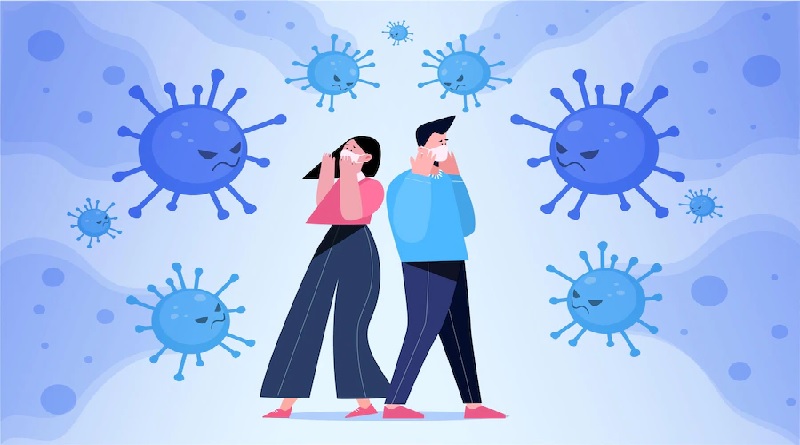You might be aware that this year’s flu season began earlier than normal or that the respiratory syncytial virus (RSV) is staging a significant comeback. You may have even heard some refer to this as a virus “tripledemic.” However, you could be asking why or what, if anything, you ought to do in response.
Why has the prevalence of the flu and RSV infections increased so much this year?
It wasn’t a surprise. There will always be fewer cases of other diseases in the same category when there are many people taking effective action to stop the spread of a specific disease.
This explains why there have been so few cases of the flu, RSV, and common cold in recent years. You are not only protected from COVID-19 by masking, social isolation, and good hand hygiene. They also shield you from a variety of other dangers.
The drawback is that since people have abandoned many of those pandemic behaviours, they haven’t recently been exposed to any of these pathogens, making them more susceptible to them. Additionally, when those viruses do resurface, they frequently become more contagious and result in more serious infections.
Is it possible to differentiate between RSV symptoms and those of the flu or COVID-19?
No. Many of the symptoms caused by all of these viruses are similar, including:
- fever
- headache
- body aches
- runny nose
- cough
- sore throat
- sinus congestion
Therefore, it is impossible to distinguish between them based purely on symptoms. There is much overlap.
Testing is the only technique to firmly identify or rule out one of these viruses. While a COVID-19 at-home test is available, a doctor visit is required to determine whether you have the flu or RSV. Additionally, a medical professional would need to examine you for strep throat, a bacterial infection that can be managed with antibiotics. It also exhibits some of these symptoms and is spreading.
What should cancer patients to do if they experience these signs?
Avoid visiting the emergency department unless absolutely necessary. Numerous of these clinics are currently overburdened with patients who have upper respiratory infections. Therefore, unless you are experiencing difficulty breathing, feeling short of breath, or have a terrible cough that is growing worse rather than better, you shouldn’t go there.
If you test positive for COVID-19 at home, check with your care team to see if they want you to begin any anti-viral treatments. Now, we have proven methods for curing COVID-19 and the flu.
Can people receive the RSV vaccine?
No. Still not. Maybe by the end of the following year. Although a few businesses are currently working on RSV vaccinations, the Food and Drug Administration (FDA) has not yet given its approval.
What Christmas traditions should cancer patients and their families follow in this triple pandemic? Is travelling secure?
Like the flu and the common cold, COVID-19 is now spreading throughout the country. However, it’s still going around, just like the flu, strep, and RSV, so it’s best to be on the safe side.
Traveling and visiting with family and friends is OK as long as you exercise reasonable prudence. This means that if you haven’t already, you should obtain your bivalent COVID-19 booster as soon as you’re eligible. Additionally, get a flu shot. The vaccinations won’t guarantee that you won’t get sick, but they will lower your chances of becoming seriously ill or needing hospitalisation.
You should keep taking the usual precautions to protect yourself. Keep acting as you have been instructed, such as avoiding large gatherings or using social distancing techniques. Even if you have received the COVID-19 and flu vaccines, you should still wear a mask when attending any large event.
Are there any unique precautions immunocompromised people should take to safeguard against COVID-19, the flu, and RSV?
No. RSV can be particularly harmful to cancer patients who have recently undergone stem cell transplants or who are immunocompromised for other reasons, as has long been known. During the winter, we notice it frequently.
But these viruses can make anyone ill. Our patients may suddenly become gravely ill. Therefore, there should be no distinction between how they behave during the holidays and the rest of the year.
By making sure they receive all of the recommended vaccinations and that everyone who will be in close contact with them does as well, caregivers can lessen the risk for their immunocompromised loved ones.
Do you have any other advise for preventing the flu, COVID-19, and RSV this year?
At Christmas gatherings, avoid interacting with anyone who have a cough, a cold, or other flu-like symptoms. They have no business being there.
Additionally, it’s crucial to rest at home if you’re sick. When it seems like forever since there have even been options for get-togethers, it might be difficult to miss them. However, don’t make matters worse by attending anyhow and spreading the illness to all of your friends and loved ones.
Get vaccinated against the flu and COVID-19 to do your best to protect both you and others. Make arrangements based on the level of risk you’re willing to take after that, and have fun.






